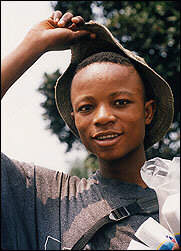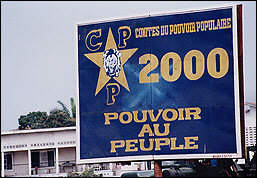 DEMOCRATIC REPUBLIC OF CONGO, A LENGENDARY WELCOMING LAND DEMOCRATIC REPUBLIC OF CONGO, A LENGENDARY WELCOMING LAND |

Due to its geo-strategic position at the heart of Africa and its key role in the development of the black Continent, the DRC is a very hospitable land open to all cultures and people. The vastness of its territory, endowed with unlimited bounties permits this land to become a refuge to foreign communities in quest of quieter environments.
Contrary to other African countries where xenophobia is on the threshold of legality, in the DRC it is enough for any foreigner to comply with the country's laws to become part of the national community. In other words, xenophobia is not Congolese. A welcoming land, the DRC has remained faithful to a legend that took so long to create and that today seems to have turned against itself. However, the Inter-Congolese Dialogue will mean one more opportunity that the Congolese people will grant to all those that had abused its good faith.
 DEMOCRATIC REPUBLIC OF CONGO: the return of a new legitimacy DEMOCRATIC REPUBLIC OF CONGO: the return of a new legitimacy |
Currently, peace is an essential condition for the take-off of the DRC. The aggression this country has suffered for the past 3 years has compromised any possible re-launching. This has also been sparked by the former regime. Internal and external dissatisfaction ignited the war, and all the peace initiatives did produced the expected results. Therefore the DRC found itself in a vicious circle.

However, with the arrival of Joseph Kabila, and his Government, things appear to be working again. When he took office, he already stated a new frame of mind during his speech of investiture. He clearly detached himself from his father's warfare policy. In his programmatic speech, he established for himself three challenges. Firstly, he committed himself to the restoration of peace. To do so, he engaged the Lusaka peace process that today seems to begin to produce results as proves the recent Pre-Dialogue held in Gaborone. Secondly, he set himself the obligation to continue the country's democratization process. The law that regulates political parties has consequently been accepted, and is already being applied. And finally, Mr. Kabila aims to reconstruct the country. A Governmental interim program has been set up and a number of foreign partners have formally agreed to support it.
The World Bank and IMF experts have started flocking into Kinshasa and are already holding talks with the country's top officials. Nothing definite has yet been leaked out about the extent to which the financial institutions are willing to open their pockets for the refurbishment of Congo's economy, but the first effects of the refurbishment of the macro-economy situation have already been felt. | The new authority in Kinshasa has established as one of its priorities the re-initiation of structural cooperation with foreign partners. The second sign of determination that characterizes the present Government involves the total commitment to the Inter-Congolese Dialogue that will take place in Addis Abeba. Ketumile Masire, facilitator of the Inter-Congolese Dialogue, received a USD 1 million check as a contribution from the Congolese Government to the catering for the needs of this groundwork. In Kinshasa, the capital of Congo, in all occupied provinces, and in those under governmental control, the hopes of the Congolese people rely on the final outcome of this forum. The survival of a whole nation could depend on it.
The Minister of Press and Communications, Mr. Kikaya Bin Karubi, sends a true message of peace and hope. "Congo has a tremendous need for the re-establishment of peace. The Congolese people are ready for peace. We welcome anyone with good will to accompany us in the paving of the national reconstruction. We ask them to come because we will receive them with open arms. It is time for peace to come and we are working on it."
The UN Mission in Congo, MONUC, seems unavoidable precisely in order to guarantee this peace and to convince the occupation troops to leave the Congolese territory. Kamel Morjane, the former Special Representative of the UN Secretary General, explains to us in the following lines the hardship of his role and that of MONUC. "It was the Security Council that established the MONUC mandate to insure the supervision of a cease-fire decided in the Lusaka Agreements. But besides this task, some activities in the humanitarian and human rights realms are carried out. With the cooperation and support of the UN High Commissariat for Human Rights, we have to see that the different parties do respect human rights. MONUC also has a humanitarian mandate in cooperation with other UN agencies that deal with human rights such as child protection. Especially the problem of child-soldiers poses today a very serious problem in the DRC. We work very closely with UNICEF. And evidently we need to add to these all the regular activities that any peace mission usually deals with. The only thing I want to point out is that the Lusaka Agreement and the Security Council have confirmed the decisions taken by the parties regarding the role of the United Nations. Lusaka decided to separate both aspects of the peace process: the military aspect and the internal political aspect. These are in the hands of the facilitator, President MASIRE, who is helping the Congolese to maintain the Inter-Congolese Dialogue. This is, in a nutshell, the role of MONUC".
In all that concerns disarmament, demobilization, rehabilitation, reinstallation and reinsertion of armed forces, MONUC has set forth some objectives. "The role of MONUC is very simple. The parties themselves have decided to separate the two aspects of the process. MONUC is not responsible for the actions taken by President MASIRE in order to prepare the Dialogue. Our role is limited to provide him with the logistics or technical support he requires. It comprises personnel support and the organization of travels. In sum, we provide all possible facilities to help him out to accomplish his task. Peace in Congo is conditioned by the success of these two sides of the process. There will not be any durable peace if there is no agreement among Congolese or a withdrawal of foreign troops. Both aspects of the process must advance together. Fighting parties cannot meet in conference halls for peace negotiations and in the battlefield at the same time. It is clear that they are both connected. Our cooperation with the facilitator and his team is intended to support and assist him in the success of his mission."
As chief of the MONUC, Mr. Kamel Morjane is upbeat about the chances of the Inter-Congolese Dialogue. "I am optimistic regarding these conversations because today everybody has realized that there is no other solution. This does not mean that the problem is already solved, that there will not be any more difficulties, the essential thing is that the Congolese get together and start talking. It does not matter how long it takes. The Secretary General said in his last report that we will be in Congo for some time. We, as United Nations, will certainly play an important role in the organization of elections the day the Congolese agree on a voting law and on the institutions they want to set up. I am sure the UN will be ready to play the same role that it has played in other countries". |

